The anxiety, grief, and profound loss so many people are experiencing during the pandemic can’t be underestimated. COVID-19 is traumatizing — it can be difficult to keep our spirits up or find joy amidst so much pain. “At a time of crisis like this, happiness is particularly elusive and attempts to find it may lead to the opposite — hopelessness and frustration,” Inna Khazan, Ph.D, a health and performance psychologist and lecturer on psychiatry at Harvard Medical School, tells Thrive.
But we know people who have a penchant for optimism are more resilient in the face of a crisis. In a recent piece in The New York Times, Emily Esfahani Smith, author of The Power of Meaning: Finding Fulfillment in a World Obsessed With Happiness, referred to a study conducted after the Sept. 11, 2001, terrorist attacks. The participants were students who had not personally lost loved ones. All the students reported experiencing heightened distress after the attacks, but the more resilient participants reported having more positive emotions, like love and gratitude. “That didn’t mean they were Pollyannas,” Smith writes. “They experience despair and stress, and acknowledge the horror of what’s happening. But even in the darkest of places, they see glimmers of light, and this ultimately sustains them.”
Even if you’re not a natural optimist, looking inwards and seeking meaning — for example a greater appreciation of life and a deeper sense of spirituality — can help to ease psychological pain and improve our mental health. “Studies show that finding meaning, rather than seeking happiness, leads to greater fulfillment and better health,” says Khazan. What she refers to as “meaning-making” can help us build resilience “because it’s something that you can choose to do,” she says. “It reinforces a sense of mastery.”
While we don’t have any control over the virus, we do have control over our attitude and response, Khazan points out. “Finding our inner resources that we didn’t even know existed, and connecting to our deepest core values increases our optimism,” she says, which in turn has a positive effect on our well-being.
“Even if you don’t see yourself as an optimist, you can behave like one,” notes Khazan. “By choosing to interpret the situation as a challenge, and believing that we have the resources to meet it, we can become healthier and more resilient.”
Here are six ways to find meaning and strengthen your resilience the way natural optimists do.
Connect with family and friends
Spend time with loved ones, even online. Getting support from friends and family during a difficult time and providing help to others will help you cope better, says Khazan, and feel more connected, which boosts well-being.
Focus on the gratitude
Fostering a sense of appreciation for what’s good in your life — maybe simply that you are safe and healthy — will direct you towards what really matters. It doesn’t mean dismissing the difficulties and suffering, “but being grateful will help you become aware of the positive and important aspects of your life, which can often be dismissed at a time of crisis,” Khazan says.
Tap into community
Being part of a religious, spiritual, or social community has been found to be comforting during times of crisis, as has giving back. Whether you join a mindfulness group, a Facebook group of people sharing similar experiences, or just schedule a regular virtual meeting with close friends, the conversations with like-minded people will lead you towards meaningful reflections and a greater sense of purpose.
Give back
Giving back not only boosts our meaningful connections with others, it’s a powerful act of self-care too. It can improve our motivation and resilience — and our physical health — (studies show that people who volunteer regularly have a decreased risk of high blood pressure). While we are following social distancing mandates, one meaningful way to give back is through the First Responders First fund, an initiative from Harvard T.H. Chan School of Public Health, Thrive Global, and the CAA Foundation, in which donations provide healthcare workers with the physical and psychological resources they so desperately need. Doing small acts of kindness for those in our communities, such as grocery shopping for people who are immunocompromised, supporting the crowdfunding initiatives of local businesses, or sending cards and letters to individuals who live alone can help bolster both your community and your sense of meaning.
Learn something new
Expanding our horizons can help us become more positive and optimistic about the future, says Khazan, who’s the author of Biofeedback and Mindfulness in Everyday Life. Unless you are a first responder or an essential worker, you may well have more time at home. “Take advantage of self-isolating for goals that you’ve never had time for in the past,” says Khazan, like learning a new language, discovering more about history, playing an instrument, or completing an online college degree.
Remember you’ve persevered before
One proven resilience-boosting tactic is to think back to a specific time in your past when you overcame an obstacle. Take deep breaths and recall a time when you persevered. Remember that you’ve made it through difficult situations before, and when you do, you’ll feel more resilient so you can persevere through whatever you’re facing now.
Follow us here and subscribe here for all the latest news on how you can keep Thriving.
Stay up to date or catch-up on all our podcasts with Arianna Huffington here.


